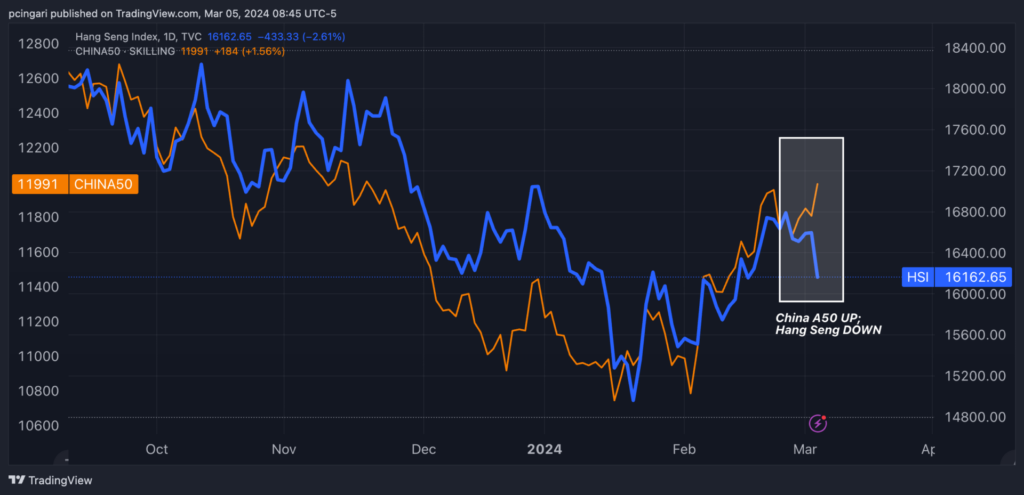China unveiled its economic objectives for the year at the 2024 National People's Congress, stirring diverse reactions across equity indices tracking Chinese stocks.
While domestic Chinese stocks have displayed signs of optimism, rallying in response to the government’s announcements, offshore Chinese equities, accessible to foreign investors, experienced a notable decline.
Beijing announced a GDP growth target of around 5%, coupled with a consumer price index (CPI) inflation ceiling of 3%, more than 12 million new urban jobs, and an unemployment rate of 5.5%.
Disappointment In Fiscal Policy
Notably, officials announced a planned 3% on-budget deficit ratio, a decrease from last year’s revised figure of 3.8%. This move has left foreign investors feeling underwhelmed, as they hoped for more substantial fiscal efforts to stimulate the recovery.
The government’s plans to allocate RMB 3.9 trillion in local government special bonds – a marginal increase from RMB 3.8 trillion in 2023 – alongside RMB 1 trillion in central government special bonds – a notable shift from none issued between 2021 and 2023 – failed to significantly bolster foreign sentiment.
Xin-Yao Ng, an investment director at Abrdn Asia Ltd., said that based on current information, government spending doesn’t appear to offer a significant boost to the economy, disappointing foreign investors.
Goldman Sachs suggests that policymakers remain committed to prioritizing economic growth this year, as evidenced by their ambitious growth target and unchanged CPI inflation target. However, the upcoming release of the fiscal budget report within the next 1-2 days will provide further insights into the effective fiscal budget ratio and the key areas of spending focus.
The Market Divide: Local vs. Foreign Sentiment
This cautious fiscal approach has led to a divergent performance in the equity markets.
On the one hand, mainland Chinese markets such as the CSI 300 and the China A50 Index have experienced gains, reaching their highest levels since late November 2023.
Contrarily, the Hang Seng Index, as tracked by the iShares MSCI Hong Kong Index Fund EWH, heavily skewed towards foreign participations, suffered its worst daily performance since mid-January 2024, falling 2.6% on Tuesday.
Shares of Alibaba Group Holding Ltd. BABA trading in Hong Kong fell 3.3%, while JD.com Inc. JD fell over 7% ahead of Wednesday’s earnings report.
Chart: Onshore Chinese Stocks Surge, While Foreign-Accessible Hang Seng Index Falls

Read now: Gold Breaks Above $2,110, Inches Closer To Record High, With Rallying Mining Stocks
Photo: Shutterstock
© 2024 Benzinga.com. Benzinga does not provide investment advice. All rights reserved.
Comments
Trade confidently with insights and alerts from analyst ratings, free reports and breaking news that affects the stocks you care about.